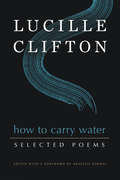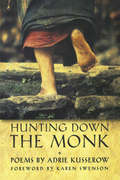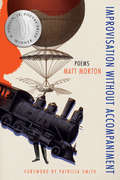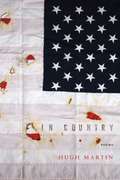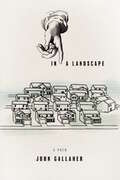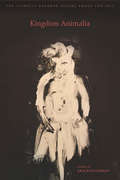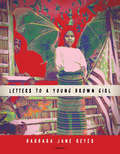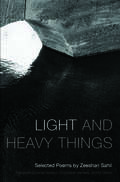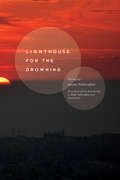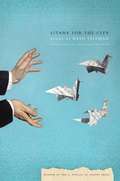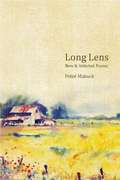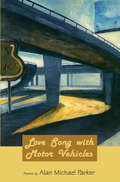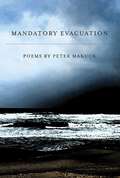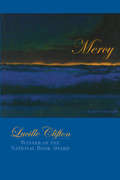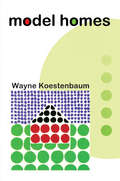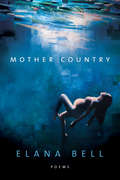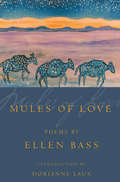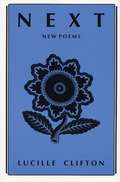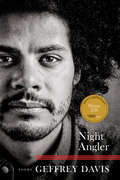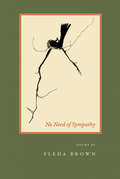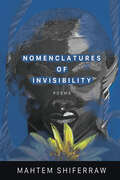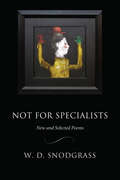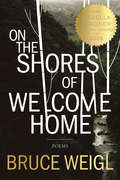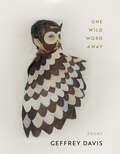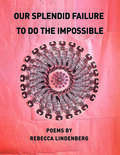- Table View
- List View
How to Carry Water: Selected Poems Of Lucille Clifton (American Poets Continuum Series #180)
by Lucille CliftonSelected Poems Of Lucille Clifton
Hunting Down the Monk (A. Poulin, Jr. New Poets of America)
by Adrie KusserowDrawing from her work in comparative religion and cultural anthropology, Adrie Kusserow offers a collection of portraits of Westerners in the East and Easterners in the West struggling to relearn and relive their ideas of culture, religion, and God. These poems expose the human craving for the nourishment of a spiritual life. Celebrated poet Karen Swenson has written the Foreword.Adrie Kusserow received her Ph.D. in social anthropology from Harvard University in 1996 and is currently associate professor of cultural anthropology at St. Michael’s College in Vermont. She continues to do cross-cultural field work on the spread of Eastern philosophies to the West.
Improvisation Without Accompaniment (New Poets of America #44)
by Matt MortonSelected by Patricia Smith as winner of the 2018 A. Poulin, Jr. Poetry Prize, Matt Morton’s debut poetry collection Improvisation Without Accompaniment embraces uncertainty with a spirit of joyous playfulness. These lyric poems follow the rhythms of life for a young man growing up in a small Texas town. As the speaker wrestles with ruptures within the nuclear family and the loss of his religious beliefs, he journeys toward a deeper self-awareness and discovers a fuller palette of experiences. Over the course of this collection, the changing seasons of small-town Texas life give way to surprise encounters in distant cities. The speaker’s awareness of mortality grows even as he improvises an affirming response to life’s toughest questions. Poignant, searching, and earnestly philosophical, Improvisation Without Accompaniment reaches for meaning within life’s joys and griefs.
In Country (American Poets Continuum #169)
by Hugh MartinHugh Martin’s second full-length poetry collection moves within and among history to broaden and complicate our understanding of war. These poems push beyond tidy generalizations and easy moralizing as they explore the complex, often tense relationships between U.S. soldiers and Iraqi civilians. The speaker journeys through training to deployment and back again, returning home to reflect on the soldiers and civilians—both memories and ghosts—left behind. Filled with recollected dialogue and true-to-life encounters, these poems question, deconstruct, examine, and reintegrate the myths and realities of service.
In a Landscape
by John GallaherFalling somewhere between a "diary-poem," a "daybook," "autobiography-in-verse," and an "essay-poem," In a Landscape is noted poet and critic John Gallaher's most personal, straightforward, and revealing book yet. In lyric-prose that continuously circles the questions it raises, Gallaher sloughs off the garb of "poet" to address life questions in a way that few poets of his generation have been willing to risk. Family, death, adoption, children, parents, high school, music . . . Gallaher's subjects carry weight because of their absolute commonness.John Gallaher is assistant professor of English at Northwest Missouri State University, and co-editor of the Laurel Review.
Kingdom Animalia (American Poets Continuum #131)
by Aracelis GirmayThe poems in this highly anticipated second book are elegiac poems, as concerned with honoring our dead as they are with praising the living. Through Aracelis Girmay's lens, everything is animal: the sea, a jukebox, the desert. In these poems, everything possesses a system of desire, hunger, a set of teeth, and language. These are poems about what is both difficult and beautiful about our time here on earth. Aracelis Girmay's debut collection won the Great Lakes Colleges Association New Writers Award. A Cave Canem Fellow, she is on the faculty at Drew University and Hampshire College. She lives in Brooklyn, New York.
Letters to a Young Brown Girl (American Poets Continuum Series #182)
by Barbara Jane ReyesLetters to a Young Brown Girl
Light and Heavy Things: Selected Poems of Zeeshan Sahil (Lannan Translations Selection Series)
by Zeeshan SahilLight and Heavy Things provides readers in this country an opportunity to discover the work of the late Pakistani poet, Zeeshan Sahil. Although readers of Urdu poetry mourned his passing in 2008, Sahil is a relatively unknown poet in the United States. Sahil's work conveys his post-modern sensibility with plain language, presenting political realities of Pakistan in personal terms.
Lighthouse for the Drowning (Lannan Translations Selection Series)
by Jawdat FakhreddineThis first US publication of Jawdat Fakhreddine-one of the major Lebanese names in modern Arabic poetry-establishes a revolutionary dialogue between foreign, Modernist values and Classical Arabic tradition. Fakhreddine’s unique poetic voice is a remarkable accomplishment-a breakthrough for the poetic language of his generation-that presents poetry as a beacon, a bright light that both opposes and penetrates all forms of darkness.
Litany for the City
by Ryan TeitmanSelected by Jane Hirshfield from over six hundred manuscripts, Litany for the City is the winner of the tenth annual A. Poulin, Jr. Poetry Prize. Of Litany for the City, Hirshfield writes, "This book carries both startling imaginative freedoms and the impulsion of a person navigating the terrain of his life by means of the star-chart and sextant of poems--a winning combination, for me."Ryan Teitman is a Wallace Stegner Fellow in Poetry at Stanford University. He holds an MA and MFA from Indiana University. He currently lives in Berkeley, California.
Long Lens: New and Selected Poems (American Poets Continuum)
by Peter Makuck"Peter Makuck sees through the detritus of daily life to what matters. . . . It’s that essence that lives deep down in things, looked for in people, sea- and landscapes, and creatures, that lifts the quotidian toward the marvelous, and animates this selection of poems from four decades."—Brendan GalvinFrom "Long Lens":Folding laundry, I can see our clotheslinewaving its patches of color like the flagof a foreign country where I had happily livedin a small clapboard house surrounded by pines.I can hear my mother in her strong accentsaying she didn’t want a dryereven when we could finally afford one—Our sheets won’t smell of trees and sunlight anymore.Long Lens represents forty years of Peter Makuck’s work, including twenty-five new poems. With precise language, Makuck’s imagery evokes spiritual longing, love, loss, violence, and transcendence. His subjects include the aftermath of the 1970 killings at Kent State University; scuba diving on an offshore shipwreck; flying through a storm in a small plane; rescuing a boy caught in a riptide; and lucid observations of spinner sharks, a gray fox, a spider, and a pelican tangled in a fishing line.Peter Makuck taught at East Carolina University from 1976 to 2006, where he founded Tar River Poetry. He was 2008 Lee Smith Chair in Creative Writing at North Carolina State University. Winner of the Brockman Award and the Charity Randall Citation, he lives on Bogue Banks, one of North Carolina’s barrier islands.
Love Song with Motor Vehicles (American Poets Continuum #Vol. 76)
by Alan Michael ParkerIn Love Song with Motor Vehicles, Alan Michael Parker marshals a penetrating wit and sharp irony that mirrors that of Charles Simic and John Berryman. Parker’s robust imagination explores the music in places poetry doesn’t usually travel. His poems find their epiphanies early on, and, most strikingly, do not close at their endings but, rather, open.Alan Michael Parker is the author of two books of poetry, and co-editor of two scholarly works, The Routledge Anthology of Cross-Gendered Verse and Who’s Who in 20th Century World Poetry (Routledge Books). In 2000, his poems were included in all three major volumes of "younger American poets" (Carnegie Mellon University Press, University of Southern Illinois Press, and University of New England Press).
Mandatory Evacuation
by Makuck PeterThrough lyrical narrative, the poems in Mandatory Evacuation find radiance in everyday people and subjects by the simple act of noticing-of seeking that which matters most. Like returning home with new eyes after a devastating storm, these poems startle us to awareness, focusing on the passage of time, the beauty of small, fleeting moments, and the importance of paying attention.
Model Homes (American Poets Continuum #Vol. 87)
by Wayne KoestenbaumWayne Koestenbaum knows how to drop the language in the blender of the imagination and hit frappe! The 13 ottava rima cantos in Model Homes present a neo-Freudian tale of the goings-on in the poet’s present home and various events from his childhood. Modulating a voice that is urbane and ribald, melancholic and wry, Koestenbaum puts a memorable spin on the status quo notion of domestic arrangements.Wayne Koestenbaum holds a Ph.D. in English from Princeton University. He was co-winner of the 1989 Discovery/The Nation poetry contest, has published three books of poetry and three books of prose, and writes frequently for The New York Times Magazine, The London Review of Books and other periodicals. He lives in New York, NY.
Mother Country (American Poets Continuum Series #183)
by Elana BellMother Country examines the intricacies of mother–daughter relationships: what we inherit from our mothers, what we let go, what we hold, and what we pass on to our own children, both the visible and invisible. As the speaker gradually loses the mother she has always known and upon whom she has always depended to early onset Parkinson’s disease and mental illness, she asks herself: “How do you deal with the grief of losing someone who is still living?” The caregiving of a child to her parent is further compounded by anxiety and depression, as well as the pain of a miscarriage and the struggle to conceive once more. Her journey comes full circle when the speaker gives birth to a son and discovers the gap between the myths of motherhood and a far more nuanced reality.
Mules of Love (American Poets Continuum)
by Ellen BassBalancing heart-intelligent intimacy and surprising humor, the poems in Ellen Bass’s Mules of Love illuminate the essential dynamics of our lives: family, community, sexual love, joy, loss, religion and death. The poems also explore the darker aspects of humanity—personal, cultural, historical and environmental violence—all of which are handled with compassion and grace. Bass’s poetic gift is her ability to commiserate with others afflicted by similar hungers and grief. Her poem "Insomnia" concludes: "may something/ comfort you—a mockingbird, a breeze, rain/ on the roof, Chopin’s Nocturnes, the thought/ of your child’s birth, a kiss,/ or even me—in my chilly kitchen/ with my coat on—thinking of you."Marketing Plans: • National advertising • National media campaign • Advance reader copies • Course adoption mailingAuthor Tour: • Berkeley • Boston • Minneapolis • San Francisco • Santa CruzEllen Bass is co-author (with Laura Davis) of the best-selling The Courage to Heal: A Guide for Women Survivors of Child Sexual Abuse (HarperCollins 1988, 1994), which has sold more than one million copies and has been translated into nine languages. She has also published several volumes of poetry, and her poems have appeared in hundreds of journals and anthologies, including The Atlantic Monthly, Ms., Double Take, and Field. In 1980, Ms. Bass was awarded the Elliston Book Award for Poetry from the University of Cincinnati. Last year, she won Nimrod/Hardman’s Pablo Neruda Prize for Poetry, judged by Thomas Lux. She was nominated for a 2001 Pushcart Prize. She lives in Santa Cruz, where she has taught creative writing for 25 years. She has also taught writing workshops at many conferences nationally and in Mallorca, Spain.
Next: New Poems (American Poets Continuum #15.00)
by Lucille CliftonFinalist, 1988 Pulitzer Prize for Poetry. "Clifton mythologizes herself: that is, she illuminated her surroundings and history from within in a way that casts light on much beyond."--The Women's Review of Books
Night Angler (American Poets Continuum #172)
by Geffrey DavisWINNER OF THE 2018 JAMES LAUGHLIN AWARDGeffrey Davis’s second collection of poems reads as an evolving love letter and meditation on what it means to raise an American family. In poems that express a deep sense of gratitude and wonder, Davis delivers a heart-strong prayer that longs for home, for safety for Black lives, and for the messy success of breaking through the trauma of growing up during the crack epidemic to create a new model of fatherhood. Filled with humor and tenderness, Night Angler sings its own version of a song called grace—sung with a heavy and hopeful mix of inherited notes and discovered chords.
No Need of Sympathy (American Poets Continuum)
by Fleda BrownNo Need of Sympathy is an exceptionally wide-ranging poetry collection, touching on contemporary science, physics, family, politics, and the natures of poetry and reality. These poems, the eighth collection by Fleda Brown, ask huge questions; they zero in like a microscope on what’s here, at hand. They are spoken with humility, great humor, curiosity, and a deep love of living.
Nomenclatures of Invisibility (American Poets Continuum Series #200)
by Mahtem ShiferrawThrough a lens simultaneously historical and political, Mahtem Shiferraw attends to personal and collective experiences of migration, motherhood, and immigration’s complicated notions of home.In Nomenclatures of Invisibility, Shiferraw calls us to carve out space for the multitudes of selves we carry when we migrate across boundaries of body, language, and state. Through a decolonial poetics, giving name to everything in her path from the Italian colonization of Eritrea (and failure to colonize Ethiopia) to her beloved eucalyptus tree, she blurs physical and temporal borders, paying homage to ancestors past, present, and future. Shiferraw writes unapologetically against erasure, against invisibility, instead creating a space that holds grief lovingly, that can tend to the wounds held and held in the endlessly-traveling body. Brilliant with abundance and texture, Shiferraw’s poems dismantle the empire's sterility of language, both historical and present. In Nomenclatures of Invisibility, Mahtem Shiferraw builds a home within her poems, attentively naming those who exist within them out of invisibility and into the radiant light: “We walk in unison too: our backs bending at once,/ our arms breaking, our abdomens kicked into silence, thighs bleeding. Through this I ask; am I still lit? And they, again…what else would you be—”
Not for Specialists: New and Selected Poems (American Poets Continuum)
by W.D. SnodgrassUntil the late 1970s, W. D. Snodgrass was known primarily as a confessional poet and a key player in the emergence of that mode of poetry in the late 1950s and early 1960s. Snodgrass makes poetry out of the daily neuroses and everyday failures of a man—a husband, father, and teacher. This domestic suffering occurs against a backdrop of more universal suffering which Snodgrass believes is inherent in the human experience. Not for Specialists includes 35 new poems complemented by the superb work he wrote in the Pulitzer Prize winning collection, Heart’s Needle, along with poetry from seven other distinguished collections.from "Nocturnes"Seen from higher up, it makes its first move in the low creekbed, the marshlands down the valley, spreading across the open hayfields, the hedgerows with their tops still lit, laps the roadbed, flows over lawns and gardens, past the house and up the wooded hillside back behind us till only some few rays still scythe between the treetrunks from the far horizon and are gone.W. D. Snodgrass, born in Pennsylvania in 1926, is the author of more than 20 books of poetry, including The Fuehrer Bunker: The Complete Cycle (BOA, 1995); Each in His Season (BOA, 1993); and Heart's Needle (1959), which won the Pulitzer Prize for Poetry. His other books include To Sound Like Yourself: Essays on Poetry (BOA, 2002), After-Images: Autobiographical Sketches (BOA, 1999) and six volumes of translation, including Selected Translations (BOA Editions, 1998), which won the Harold Morton Landon Translation Award.
On the Shores of Welcome Home (American Poets Continuum #176)
by Bruce WeiglIn this Isabella Gardner Award-winning collection of poems, Bruce Weigl meditates on the ghosts and the grace one encounters in life’s second act. A celebrated poet and veteran of the Vietnam War, Weigl offers a nuanced sense of aging as a departure and death as a returning home. With a sage’s eye for mindfulness and a soldier’s longing for the country where he served, Weigl’s poems reveal the long scars left by Vietnam and the new possibilities one encounters in the wake of life-altering experiences.
One Wild Word Away
by Geffrey DavisWhen tensions veer between hope and despair, the ensuing fracture can swing like a scythe and cut a ragged seam between past and present. In One Wild Word Away, Geffrey Davis weaves a deft set of poems about illness, family, loss, and rebirth. The luxurious sonics and crisp descriptions in each line are haunted by grief and buoyed by love as the speaker confronts generational trauma and the loss of a loved one while in the process of raising his own son.
Our Splendid Failure to Do the Impossible
by Rebecca LindenbergLiving in landscapes of ruin and ruination, memory and problematic nostalgia, Rebecca Lindenberg’s Our Splendid Failure to Do the Impossible plumbs the depths of disruption, decay, and how we go on when the world stops cold. Inspired by the speaker’s experiences of living with type 1 diabetes, the collection chronicles humanity’s daily fight for survival in a world that’s bent on destroying itself.Lindenberg centers love, self-acceptance, and intimacy as incomparable balms across great geographical and psychological distances, and asks the reader to do the impossible: hope.
